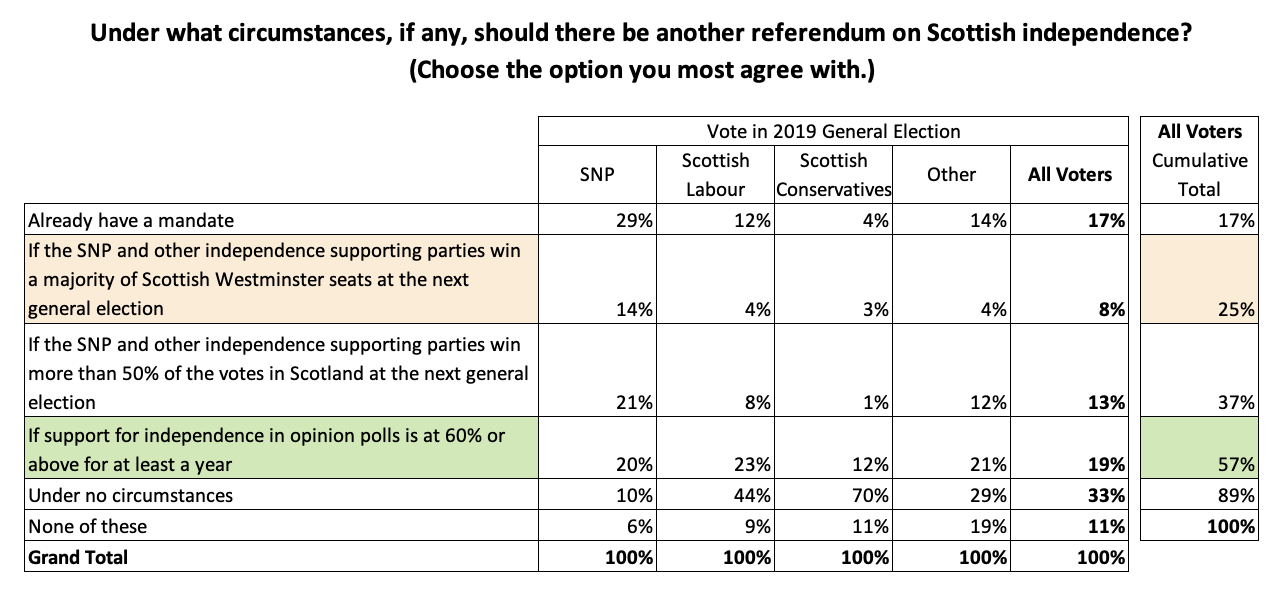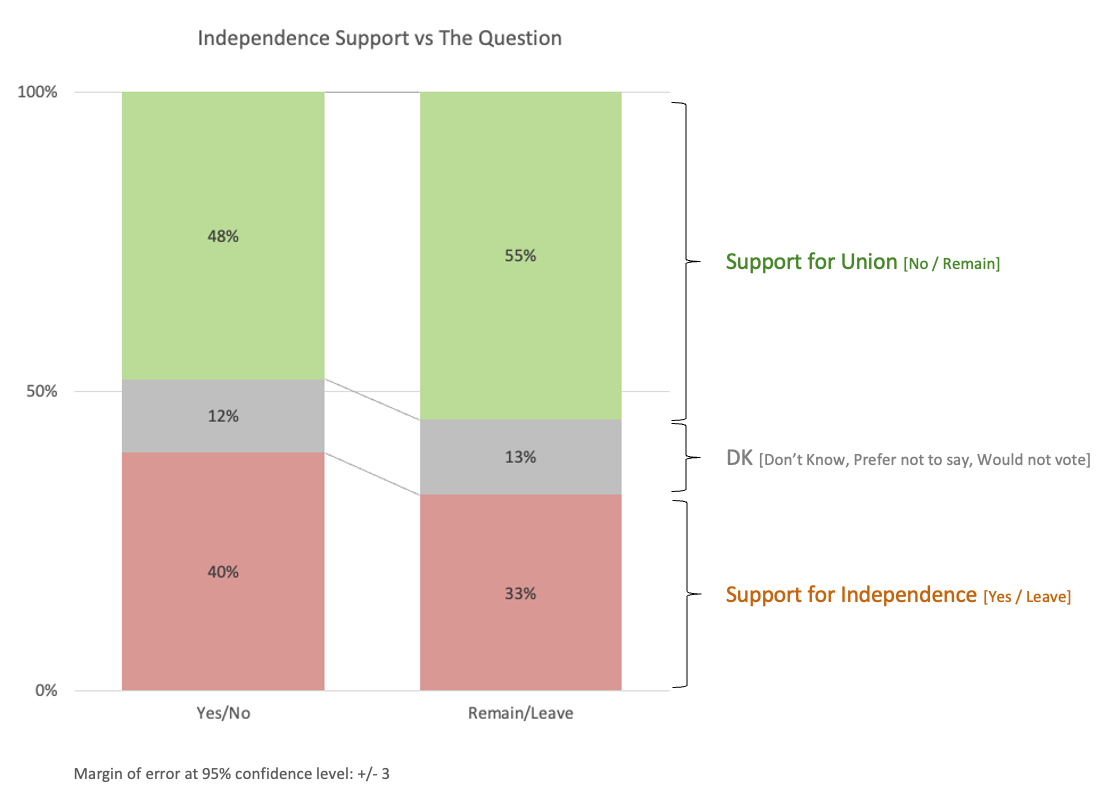IT’S THE WAY YOU ASK THEM
20 November 2023
Our latest poll reveals that more than 10% of those who say they would vote "Yes" to independence think that an independent Scotland could "remain" inside the United Kingdom.
Key Findings
-
Only 29% of 2019 SNP voters believe the Scottish Government already has a mandate for another independence referendum.
-
In addition, only 14% of 2019 SNP voters agree that winning “a majority of seats at the General Election in Scotland” should count as a mandate for another independence referendum (despite SNP conference passing a motion which states that this should count as a mandate “for independence negotiations”)
-
Combining the two groups above implies only 43% of 2019 SNP supporters (25% of the electorate overall) agree with the SNP’s newly adopted policy position1Arguably less, as the SNP’s policy position is that this provides a mandate “for independence negotiations” rather than for an independence referendum
-
Of the options polled, majority support only exists for another independence referendum if we include those who chose “If support for independence in opinion polls is at 60% or above for at least a year”.
-
When judging support for independence in opinion polls, it’s important to understand the importance of how the question is asked.
-
12% of “Yes” supporters (a small but highly significant 5% of the Scottish electorate) explicitly believe that Scotland “can become an independent country and remain inside the United Kingdom”.
-
Asking people if they support Scottish independence by using the traditional Yes/No question adds at least 5 and perhaps as many as 7 percentage points to observed support for independence (compared to asking a more neutral Remain/Leave question).
-
When judging public opinion towards independence – or if there is ever to be another referendum – this evidence of pro-independence bias when using the Yes/No question cannot be ignored.
Polling of 1,037 Scottish Adults (18+) carried out by Focaldata, fieldwork 6-18 October 2023.2Link to data tables with explanatory note is at the foot of his report
�
What Constitutes a Mandate?
Understanding true support for independence is clearly important when it comes to the question of if and/or when another independence referendum should happen. Our poll asked “under what circumstances, if any, should there be another referendum on Scottish independence” and offered a range of possible options from which only one could be chosen.

The argument that Westminster has somehow denied Scotland’s democratic will by not allowing another independence referendum within this parliament carries little support. Even looking only at those who voted SNP in 2019, just 29% agree that the Scottish Government already has a mandate for a referendum (that figure drops to 17% across all voters).
“Conference believes that if the SNP subsequently wins a majority of the seats at the General Election in Scotland, this constitutes a mandate for independence negotiations with the UK Government …”
- Motion passed at SNP Conference, 15th October 2023
In addition, only 14% of those who voted SNP in 2019 (and just 8% of all voters) agree that the SNP winning a majority of Scottish seats3The version we polled was slightly less restrictive as it referred to “independence supporting parties” but, given how unlikely it is that the Scottish Greens would win a Westminster seat, this is not particularly relevant. Field work was carried out 6 – 18 October, so overlapped with (but was mostly before) the SNP conference which was held 15-17 October. at a General Election would be a mandate for another referendum (let alone “for independence negotiations”). Combine these with those who believe the SNP already have a mandate and that suggests only 43% of 2019 SNP supporters implicitly agree with the SNP’s new policy position.
Looking at the final column in the table above: as we descend through the options the threshold for a referendum gets higher, so the only point at which majority [57%] support for another referendum is achieved is when those who chose “If support for independence in opinion polls is at 60% or above for at least a year” are included.
First Minister Humza Yousaf clearly faces an uphill battle if he is to convince even his own supporters that by not agreeing to another independence referendum Westminster is somehow denying the democratic will of the Scottish people.
If the SNP want support from a majority of Scots for another independence referendum, the challenge they face is clear: they need to demonstrate sustained support for independence from a majority of the Scottish electorate. This is something they have consistently failed to achieve.
It’s The Way You Ask Them
When judging public opinion towards Scottish independence, the wording of the question matters.
In the 2014 independence referendum voters were asked a simple Yes/No question: “Should Scotland be an independent country?”
In the 2016 EU referendum, the electoral commission expressed concerns about the neutrality of asking a Yes/No question and instead recommended a Remain/Leave question:4https://www.electoralcommission.org.uk/who-we-are-and-what-we-do/elections-and-referendums/our-reports-and-data-past-elections-and-referendums/eu-referendum/testing-eu-referendum-question “Should the United Kingdom remain a member of the European Union or leave the European Union?”
To test whether support for Scottish independence is influenced by the wording of the question, pollsters have previously tested asking a Remain/Leave version of the independence question. This has consistently demonstrated weaker support for independence than the Yes/No version (typically showing a 60:40 lead for Remain5https://www.whatscotlandthinks.org/questions/f-there-was-a-referendum-tomorrow-with-the-question-should-scotland-remain-in-t/ compared to a 52:48 lead for No6https://www.whatscotlandthinks.org/questions/how-would-you-vote-in-the-in-the-scottish-independence-referendum-if-held-now-a/).
This latest poll by These Islands is, to the best of our knowledge, the first time both versions of the question have been asked of the same respondents in a single poll. The findings are striking and confirm what many have long believed to be the case: how the question is asked has a major influence on the result.
Note on methodology: to avoid any distortion being caused by the order or placement of the questions within the poll, half of those polled were asked the Yes/No question [“Should Scotland be an independent country?”] near the beginning of the poll and the Remain/Leave question [“Should Scotland remain in or leave the United Kingdom?”] near the end. The other half were asked the questions in the opposite order.
If Don’t Knows are excluded, the results we see are broadly in line with previous polls: a 55:45 lead for “No” translates into a 63:37 lead for “Remain”. Allowing for Don’t Knows, the same set of survey respondents demonstrate 40% support for “Yes” but just 33% support for “Leave”.

This is in line with previous polls which have consistently shown higher support for the union when asking the Remain/Leave rather than the Yes/No question. In the past, pro-independence supporters have challenged whether this is due to respondents being confused by the question wording. The design of this poll allowed us to test this hypothesis: because we asked both questions of the same respondents, we were able to ask the 7% of voters who chose “Yes” to independence but “Remain” to staying within the UK a supplementary question: “Do you believe that Scotland can become an independent country and remain inside the United Kingdom?” Most (66%) agreed that they thought this would be possible.
What this polling therefore shows is that a small but highly significant 5% of the electorate (12% of “Yes” supporters) explicitly believe that Scotland could be independent and remain within the UK. This means the pro-independence cause gains at least 5 and perhaps as many as 7 percentage points of support from the Yes/No question wording, support which is based on a fundamental misconception of what independence would mean.
Perhaps talk of “independence within the EU” has led some people to believe in the possibility of “independence within the UK”. If this is the case, then those voters fail to grasp the fundamental differences between the unions of the UK and the EU.
To illustrate: the UK is a union within which taxes are pooled and shared and which operates an integrated welfare state. In contrast, there is no EU welfare state and EU members are required to be fiscally autonomous; German taxes do not help fund Greek pensions. If an EU member state runs an excessive deficit, then it becomes subject to excessive deficit procedures, but Scotland’s deficit as revealed in the annual GERS report is a paper exercise only (it has no impact on the Barnett Formula driven block grant or reserved spending in Scotland).
What we may be witnessing here is a combination of confusion about what independence from the UK actually means and simple acquiescence bias (the tendency people have to be agreeable and choose positive, affirming answers). Either way this polling demonstrates that when judging public opinion towards independence – or if there is ever to be another referendum – this evidence of pro-independence bias when using the Yes/No question cannot be ignored.
Technical Details
Polling of 1,037 Scottish Adults (18+) carried out by Focaldata, fieldwork 6-18 October 2023.
The following link provides access to the data tables for the relevant questions.
Please note that to allow testing of both questions while avoiding any distortion caused by question placement, half of those polled were asked the Yes/No question near the beginning of the poll and the Remain/Leave question near the end. The other half were asked the questions in the opposite order. This means that – to get Yes/No and Remain/Leave totals when using these tables – the results must be combined from the two Yes/No questions (Q6, Q24) and from the two Remain/Leave questions (Q7, Q25). For the same reason, the results from the two identical supplementary questions (Q26, Q27) must be combined.
These Islands October 2023 Data Tables
Please log in to create your comment